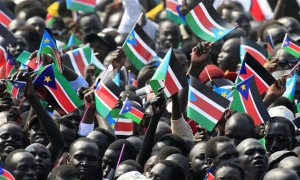90% of Greater Bahr el Ghazal citizens want new political parties: poll
June 2, 2013 (JUBA) – At least 89% of the population in South Sudan’s Greater Bahr el Ghazal region say they prefer a new political party takes over the country’s affairs, a recently conducted poll shows.

South Sudan gained independence nearly two years ago after its population overwhelmingly chose separation in a self-determination referendum. The vote was a key part of the 2005 peace accord, which ended over two decades of the north-south Sudan civil war.
Since it independence, however, the young nation has been grappling with several challenges, which its current leadership has tried to address, despite the difficulties.
The government, at independence, pledged to deliver all the much-needed services to citizen, but most of these are yet to be seen, given the economic difficulties the new nation faces.
Some citizens, however, blame government for allegedly lacking the political will to serve the country, despite its commitment to do so.
Those interviewed, for instance, said corruption remains a huge setback to the new nation, further accusing top politicians with the SPLM of aggravating the problem, instead of seeking remedies to it.
Corruption, according to the polls, is South Sudan’s biggest problem after unemployment. In South Sudan, the majority of the workforces, predominantly youth, are jobless, yet they account for about 70% of the country’s population.
However, while 89% of the population interviewed during the unpublished poll wanted new parties formed before the next election, 76% considered all the existing political parties to be the same.
Public disillusion, experience show, has helped smaller parties come to the limelight in South Sudan, such as the African National Congress (ANC) and the SPLM-DC, under the leadership of former Sudanese vice president George Kongor Arop and Lam Akol, Sudan’s ex-foreign affairs minister respectively.
Meanwhile, a top SPLM official has warned the south-ruling party to take note of the finding from the IRI polls, saying they could be signs of bad times ahead for the party.
“The readings are worrying. If our leadership does not adopt new strategies and change the current way of doing thing, especially lack of political will to listen to the concerns of our people at the grass root level by providing basic services continue, detached itself from corrupt officials and actually hold them accountable before the public to safeguard justice,” he official, who preferred anonymity, told Sudan Tribune.
I think it will be difficult to change the current hearts and minds of our people who are desperately looking for a change, he added, further expressing fears that the population may soon vote against the SPLM for the sake of change.
“I decided to be silent because [the] current political environment is fluid with suspicions. I am seeing that you young people are quick in misreading things and very fast with misinterpretations. This is what I do not want,” said the official, also a member of the SPLM political bureau.
I have seen a lot of things happening before me, from within the SPLM while in the bush and after coming to the town. I want these issues to be deliberated in the convention not in the media, he said.
(ST)
